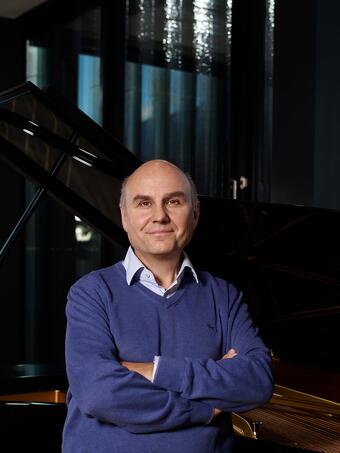
Teacher of Keyboard Skills
In the bachelor's degree programme in instrumental music education, students focus primarily on furthering their artistic skills in the two instruments they have chosen. In didactic classes, students learn how to teach their chosen instruments; the instrumental side of the curriculum is complemented by in-depth training in music theory and musicology.
Length of course
8 semesters / 240 ECTS-AP
Language
German
Application period
1.2.–28.3.2025
Admission examinations
Summer semester of each year
to the dates
The teacher training programme for secondary education consists of a Bachelor's and a Master's programme and trains students to become teachers in their chosen subjects.
The Bachelor's degree programme in Secondary Education is designed to be completed within 8 semesters. Two teaching subjects must be chosen, in addition to which students are required to complete free elective subjects, a general grounding in educational science, and integrated teaching placements. The teaching subject Instrumental Music Education can only be studied in combination with the subject Music Education.
Students receive individual tuition from first-class teachers in their chosen instruments and can develop both artistically and in the area of pedagogy. Alongside artistic and music theory training, a focus is placed on the subject of music in school from the very beginning. The courses in didactics introduce methods and concepts for teaching music and also cover such areas as listening education, digital media and practical music making in the classroom.
This degree course is orientated around current developments and performance practice in the arts, as well as the latest, most up-to-date research in the academic disciplines involved. It refers to the curricula of secondary schools and the general and holistic educational goals contained therein.
The teacher training programme at secondary level is carried out in cooperation with the following partner institutions (Western Region Partnership):
Applicants should...
The aim of the Bachelor's degree programme is to prepare students for a career in secondary school teaching. A full teaching qualification can be obtained by consecutive enrolment in the corresponding Master's programme. However, the Bachelor's programme alone also opens up further professional fields, such as extracurricular youth education, adult education, cultural and media work, etc.
The study programme should also contribute to the students' personality development and the development of social competences. After completing the BA teaching degree in the subject Instrumental Music Education, students should:
The breadth of the curriculum should enable future teachers to make music accessible to a wide ranger of learners in both production and reception. The full teaching degree programme (BA + MA) qualifies students to teach at:
Applicants to the degree programme must specify their intended majors at the time of registration. The principal and secondary artistic majors must be from different areas: Keyboard instruments, string instruments, plucked instruments, wind instruments, classical singing, jazz/pop singing, music direction and percussion instruments.
Artistic majors (1st and 2nd KHF) can be chosen from the following list:
Students have the choice of the following instruments as their artistic majors (principal and secondary study):
For admission to the Bachelor's programme, various certificates and examinations are required:
As part of the Bachelor's degree programme in Instrumental Music Education, two instruments or one instrument and voice must be studied as artistic majors. All instruments offered at the Mozarteum University Innsbruck as well as singing, jazz/pop singing and conducting can be chosen as artistic majors. The choice of instrument must be indicated when registering for the entrance examination
The teaching subject Instrumental Music Education must be combined with the teaching subject Music Education; an entrance examination at the Mozarteum University (Innsbruck campus) is required for both teaching subjects. However, the general admission procedure for teacher training courses only needs to be completed once.
The General Admissions Procedure for all teaching degress (regardless of subject) consists of several steps:
Please check the Western Region Partnership website for exact dates and procedures.
Registration for the entrance examination takes place via the application portal Muvac - information see 'Registration for the entrance examination'.
Link to the registration deadlines
Link to the examination dates
Registration may only be made for one location, either Central Region (for Salzburg and Linz) or Western Region (for Innsbruck). Multiple registrations at different locations are not permitted and will be cancelled.
Documents required for online registration
Form of the documents
The audition
Partial examinations are to be taken in the following areas:
The examination requirements are regulated in the guidelines, information on the German language certificates can be found HERE.
You can find more information about starting your studies here: